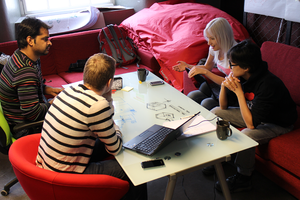
Photo: EUROCITIES
Interview with Anna Lisa Boni, Secretary General of EUROCITIES
31 July 2014
by Richard Forster
Anna Lisa Boni took up her new post as Secretary General of EUROCITIES, the Brussels-based network of major European cities, on 19 June. She spoke with Jonathan Andrews about how she believes that cities are the engines to drive Europe out of its economic slump and if cities are to innovate, they must network more with each other
What will be your key area of focus in the first 100 days as Secretary General?
As I begin leading the EUROCITIES secretariat, my first steps will be to ‘look, listen and learn’ and to lay the groundwork for our cities to play a key role within the renewed EU institutional framework–in particular on important initiatives like the European urban agenda.
You said in the April edition of Cities Today that you want EUROCITIES to be the lead European city organisation and the ‘go-to’ organisation for European institutions. What steps will you be taking to achieve this?
Major European cities already play an important role in addressing issues related to economic growth, environmental sustainability and inclusiveness. This role is only set to increase in future as our cities become more and more central to achieving the EU’s strategic goals. As a respected network of big cities, we are in a good position to lead key debates with the European Commission and the European Parliament, such as that around an EU urban agenda. It will be essential, for example, to ensure that the European Parliament’s urban intergroup is maintained, and that its programme reflects the current challenges and priorities facing cities. It will also be important to support and feed into the work of the Committee of the Regions in this area.
Cities inherently compete against each other, particularly in compact and increasingly interlinked European cities. Is it possible to be competitive and at the same time network and share ideas with other cities?
For cities to be competitive today, they must network with each other. This is why I believe EUROCITIES provides very important added value to its membership. It gives cities the chance to be inspired by other European urban
challenges and solutions. We all know that innovation doesn’t come from simply sitting at a desk. Being inspired by what others are doing plays a big part in developing new ideas and finding ways to tackle challenges.
Networking is also important at the local level because there is and will continue to be a greater need for collaboration between different levels of governance. Cities act as ‘connectors’, pulling together and strengthening these links.
Local government is often referred to as the level of government ‘closest’ to the people. By bringing EUROCITIES closer to the EU would this improve the EU’s perceived lack of relevance in the day-to-day lives of city residents? Can cities take a lead in driving Europe out of its economic slump?
Through our membership and our resources, we are contributing to raising awareness about the EU among European citizens. However, this is too big a task for EUROCITIES to address alone. I believe it is more the responsibility of the European institutions and the individual member states. Cities can take the lead in driving Europe out of its economic slump, and they are already doing so by generating 75 percent of European GDP. Emerging from the crisis, it’s clear that more and more of Europe’s growth will come from our big cities.

EUROCITIES was established in 1986. What have been some key achievements?
In 1986, EUROCITIES was made up of six founding cities (Barcelona, Birmingham, Frankfurt, Lyon, Milan and Rotterdam); today it is a thriving network of some 140 member and partner cities from all over Europe. EUROCITIES has become the collective voice for Europe’s biggest cities on urban issues. It has succeeded in changing the discourse at EU level of cities as solutions, rather than problems: they are now recognised as crucial partners in achieving the Europe 2020 goals. In terms of concrete achievements, it’s worth noting that following the negotiations around the 2014-2020 financial perspectives, a minimum 5 percent of European Regional Development funding has been allocated to sustainable urban development, and €330 million is dedicated to innovative actions in urban areas.
EUROCITIES has also built up a network of nearly 3,000 city representatives, who politically debate and technically exchange knowledge through six thematic forums, more than 40 working groups and numerous European projects.
In April the World Business Council for Sustainable Development released a report on city-business links being crucial for sustainable development. How is EUROCITIES helping to foster such relationships and partnerships?
EUROCITIES has many members with proven experience of how important city-business links are. Our economic development forum is one of the platforms where cities can debate and exchange around this key issue, particularly in terms of models and experiences of public-private partnerships. Many cities have measures in place to make life easier for businesses, such as one-stop-shops to facilitate contact between the city government and business; business incubators; and easy access to public procurement. Our cities also provide the right environment in which businesses can thrive, offering good quality services and infrastructure and effective city branding.
This issue of Cities Today focuses on finance. What role, if any, can associations like EUROCITIES play in attracting municipal finance and investment?
This role is mainly carried out at city level, but we do support our members in many ways when it comes to finance. For example, we provide information and intelligence on European financial engineering and access to financial instruments for local SMEs, or about innovative models of municipal financing and public-private partnerships. We also helped influence the legislation on European Structural and Investment Funds 2014-2020 to allow cities to easily combine EU grants and financial instruments.
How is EUROCITIES funded? How do you decide on which cities can join the association?
We are mainly funded through membership fees and European funding. As of 2014, we have over 130 members and 40 partners in 38 countries, as well as being a consortium partner in many European projects and initiatives.
In principle, any European city with a population of more than 250,000 inhabitants can become a member. Cities with fewer than 250,000 inhabitants, as well as private businesses, can become partners in one or several of our forums.
We also have a subscriber option for stakeholders not eligible for membership, which gives them access to our information channels on a yearly basis. This category applies to organisations such as European public sector networks, foundations, think tanks, universities, research institutes, NGOs or non-European cities.
When a city applies for membership, their application must be approved by our executive committee, made up of elected representatives from 12 member cities. Applications from potential partners are also considered by the steering committees of the relevant forums.
Your annual conference, to be held in Munich in November, will focus on intelligent energy for cities. Are European cities taking a lead in this field or are you seeing its importance reduced due to lower budgets?
European cities are certainly taking the lead in this field. Our cities are responsible for 80 percent of energy consumption in Europe, so intelligent energy solutions developed in and by cities are set to have a great impact. European cities are therefore at the forefront of tackling this challenge, and our annual conference in Munich will showcase innovative solutions and provide for debates on future targets.








